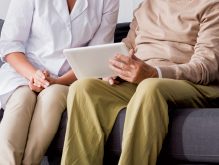 Whisper “sweet nothings” but a kiss on the ear can be dangerous to your hearing
Whisper “sweet nothings” but a kiss on the ear can be dangerous to your hearing
An innocent gesture can quite literally be ‘the kiss of deaf’.
Research shows that a kiss on the ear can cause permanent hearing loss.
An innocent kiss on the ear opening can create a strong suction that tugs on the delicate eardrum. This intense suction on the eardrum pulls the chain of three tiny bones in the ear. With this ‘kiss of deaf’, the stapes can tug on the tissue that connects the stapes to the oval window of the inner ear. This causes turbulence in the fluid of the inner ear, and can lead to hearing loss.
Prevention is the best cure: Dr. Levi Reiter, a professor in audiology at Hofstra University in New York, has identified more than 30 ear-kiss victims. According to his patients, the ear-kiss injury feels like being hit by a ball on the ear. One of them says that it is like hearing through a screen of some sort, and that in the ‘kissy ear’, speech is totally muffled.
Though hearing aids may help ear-kiss victims to hear better, some people with a ‘kissy ear’ still experience intermittent sensations of aural fullness and an itch in the inner ear.
Dr. Levi Reiter speculates that an injection of steroids through the eardrum might be a possible treatment. This type of injection is normally used in cases of sudden sensorineural hearing loss (SSNHL), but to be successful the treatment has to start shortly after the person experiences hearing loss.
However, the treatment has yet to be tried on ear-kiss victims. Meanwhile, the symptoms do not tend to go away. As a result prevention is the best way to avoid ‘the kiss of deaf’.
“Not tonight, I have a Headache!”
High Use of Tylenol, Advil Linked With Increased Risk of Hearing Loss in Women, Study Suggests Popular pain-relievers might increase the risk of hearing loss in women, depending on how often they are used, a new study suggests.
Researchers from the Brigham and Women’s Hospital found that use of acetaminophen or ibuprofen more than once a week is linked with an increased risk of hearing loss in women. Their findings are published in the American Journal of Epidemiology.
“Possible mechanisms might be that NSAIDs [non-steroidal anti-inflammatory drugs] may reduce blood flow to the cochlea — the hearing organ — and impair its function,” study researcher Dr. Sharon G. Curhan, M.D., of the Brigham and Woman’s Hospital Channing Division of Network Medicine, said in a statement. “Acetaminophen may deplete factors that protect the cochlea from damage.”
Researchers examined the effects of acetaminophen, ibuprofen and aspirin on the hearing of 62,261 women who were between ages 31 and 48. The women were followed for 14 years, after which 10,012 ended up reporting some kind of hearing loss.
The researchers found that taking acetaminophen two or three days a week raised the risk of hearing loss by 11 percent, while taking it four or five days a week raised the risk by 21 percent.
And they found that taking ibuprofen two or three days a week raised the risk of hearing loss by 13 percent, taking it four or five days a week raised it by 21 percent, and taking it six or more days a week raised it by 24 percent.
However, researchers didn’t find any increased risk of hearing loss linked with aspirin use.
It’s important to remember that the study only shows an association, and not a cause-and-effect relationship. But still, “if individuals find a need to take these types of medications regularly, they should consult with their health care professional to discuss the risks and benefits and to explore other possible alternatives,” Curhan said in the statement.
For information, contact HearUSA in Boca Raton or Delray Beach at (855) 270-1587.
Check Also
Trusted Homecare Agency: Serving Veterans with Free Supplemental Home Healthcare
When it comes to healthcare, veterans deserve the best care possible. For veterans seeking in-home …
 South Florida Health and Wellness Magazine Health and Wellness Articles
South Florida Health and Wellness Magazine Health and Wellness Articles




